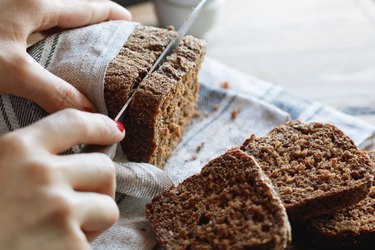
The next time you're at the grocery store, stop and take a moment to look at all the options there are when it comes to bread. White bread, whole-wheat bread, multigrain — the list goes on. But there's one type you see on the rack that you don't hear about quite as much as the others: rye bread.
With its dark brown color, it catches your eye, and you probably can't resist feeling a little curious. You've heard claims that rye is a tasty and healthy alternative to white bread, and you can't help wondering: Is rye bread a nutritional powerhouse among the other loaves, and could it possibly even help you lose weight?
Video of the Day
Video of the Day
What Is Rye Bread?
Like wheat, rye is a grain that can be used both in its whole form and in a refined form, according to the Grains & Legumes Nutrition Council. Bread made from whole-grain rye flour has a dark color, while refined rye flour produces a lighter-colored bread.
With less gluten than wheat, rye makes bread denser, and because it is made with sourdough methods, it has a little bit of a sour flavor. You might have also heard of rye bread by its German name: pumpernickel.
Rye nutrition data reflects a breadth of benefits: It's high in protein, low in fat and a good source of nutrients like fiber, manganese, copper, magnesium, phosphorous, B-complex vitamins, phenolic antioxidant compounds and many other vitamins and minerals. In contrast, white bread nutrition is lacking in vitamins and minerals.
Fill Up on Rye
One of rye's biggest benefits is its fiber content. Unlike other grains, rye has a high level of fiber in its endosperm as well as its bran and therefore has a lower glycemic index (GI) than other grain products. That means its carbohydrates are digested and broken down into glucose much more slowly. According to the American Academy of Family Physicians, rye bread is classified as a moderate GI food, unlike white bread and other processed carbohydrates, which are high GI foods.
Because fiber is the part of plant foods that your body can't break down, it passes through your system undigested. Combined with adequate fluid intake, it keeps your digestive tract in proper functioning order and reduces the risk of heart disease and diabetes.
Fiber for Weight Loss
Rye's fiber content means that it will make you feel full quickly, making it ideal for dieters trying to lose weight. In a small study published in PLOS One in March 2016, nineteen young adults who ate whole-grain rye bread for a late evening meal had an increased release of satiety hormones over their peers who ate white bread, meaning that rye bread might be beneficial in preventing obesity or just helping you drop a few pounds.
If you're going to turn to rye bread for its health benefits, you should be sure you're selecting whole-grain rye products (it's as easy as scanning the ingredient list for the word "whole") just as you would if you were switching to whole-grain wheat bread. A whole-grain product will have at least 3 grams of fiber per serving. These products will help you feel full faster and for longer, thus preventing overeating, and will deliver a range of vitamins and minerals.
Read more: 10 Dos and Don'ts for Using a Food Diary
- American Academy of Family Physicians: "Changing Your Diet: Choosing Nutrient-Rich Foods"
- PLOS One: "Rye-Based Evening Meals Favorably Affected Glucose Regulation and Appetite Variables at the Following Breakfast; A Randomized Controlled Study in Healthy Subjects"
- Oldways Whole Grains Council: "Whole Grains A to Z"
- Mayo Clinic: "Dietary Fiber: Essential for a Healthy Diet"
- American Academy of Family Physicians: "Glycemic Index and Your Diet"
- ScienceDirect: "Antioxidant Activity and Nutrient Composition of Selected Cereals for Food Use"
- Grains & Legumes Nutrition Council: "Rye"